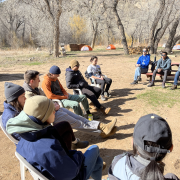“It is the sin of the soul to force young people into opinions…but it is culpable neglect not to impel young people into experiences.” – Kurt Hahn, German educator, and founder of Outward Bound
“We do not learn from experience… we learn from reflecting on experience.” – John Dewey, American philosopher, psychologist, and educational reformer
campground debrief, students reflect on their day at the Spring 2023 Experiential Leadership Intensive, Sylvan Dale Ranch, Loveland, CO.
“Knowledge is created through the transformation of experience.” – David A. Kolb, American psychologist, professor, and educational theoris
Hahn and Dewey were onto something in the first half of the 20th century and helped lay the foundation for experiential learning theory and practice as we know it today—students learn and create knowledge through a concrete experience, and by reflecting on and making meaning of the experience they can transfer and apply new understandings to future situations.

Leadership challenge course debrief, students reflect on their group experience at the Fall 2023 Experiential Leadership Intensive, Outdoor Pursuits Challenge Course, CU Boulder Campus.
Harvey et al. (2016) define reflection as the intentional process of engaging a student’s cognitive, emotional, and physical capacities to mindfully consider past experiences to learn, grasp and potentially improve future actions. Active reflection enhances both classroom and experiential learning by helping students connect their experience and ideas to future contexts (Kolb & Kolb, 2018).
While the importance of reflection can be critical to learning, it is easy to neglect if dedicated time and space are not provided for it to occur. Intentional and active reflection can take several forms, from prompted writing and journaling to facilitated dialogue, and needn’t be complex or burdensome to include in a course or program.
One of many approaches, Borton’s (1970) model for reflection is commonly used in experiential education settings due to its ease of application and includes three primary questions to pose to students – What? So What? and Now What?
|
The integration of reflection in the learning process, regardless of the form or model utilized, can aid students in constructing meaning from their experience—thereby creating new knowledge and skills to be applied in other areas of their lives.
Seth Webb serves as the Director of Experiential Education in the CU Boulder Center for Leadership. The mission of the Center for Leadership is to invest in the leadership potential of all students and develop ethical, impactful leaders.
References
Borton, T. (1970). Reach, touch and teach: Student concerns and process education. McGraw- Hill.
Harvey, M., Coulson, D., & McMaugh, A. (2016). Towards a theory of the ecology of reflection: Reflective practice for experiential learning in higher education. Journal of University Teaching & Learning Practice, 13(2), 3-22.
Kolb, D. A. (1984). Experiential learning: Experience as the source of learning and development. Prentice Hall.
Kolb, A., & Kolb, D. (2018). Eight important things to know about the experiential learning cycle. Australian Educational Leader, 40(3), 8-14.

